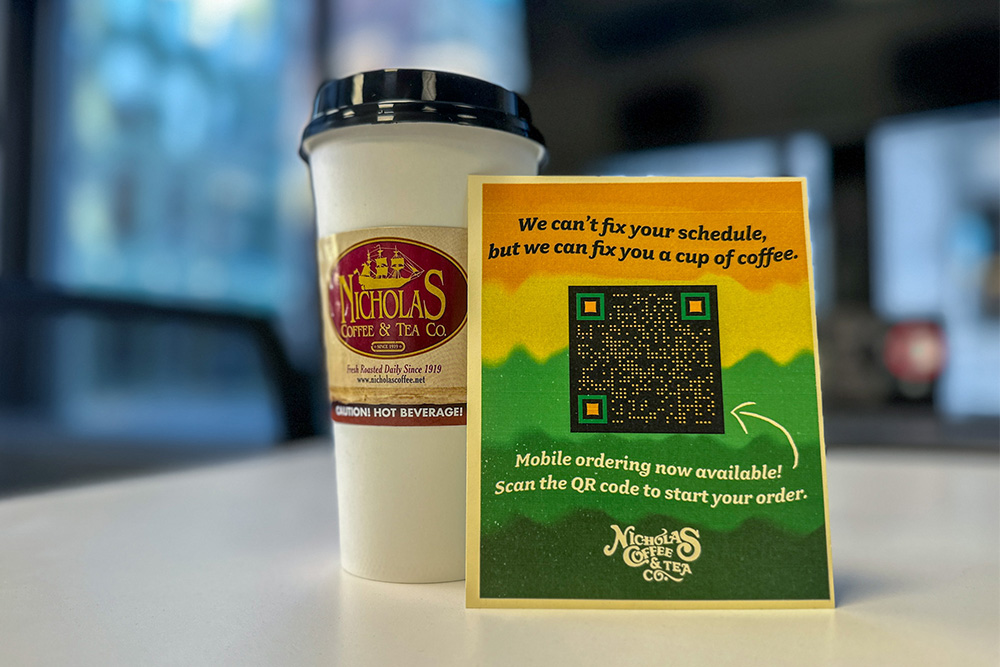Point Park Students Helped Launch Mobile Ordering at Nicholas Coffee & Tea Thursday, September 18, 2025

A coffee cup from Nicholas Coffee & Tea sits on a desk in Point Park University's West Penn building. The advertisement and QR code to mobile order were distributed at several parts of campus earlier this semester.
"Having that hands-on experience and seeing real-life data and activity helps you practice what you are learning."
As students at Point Park University rush between classes and extracurriculars this fall, one local business is hoping that students will use a new mobile ordering option that was designed by their peers.
Earlier this year, the team at Nicholas Coffee & Tea joined students in the classroom as a part of the university’s Principles of Marketing and Sales course to discuss new strategies for their business. Throughout the class project, one student group worked to develop a feature common to most coffee shops: online ordering.
“The first tenant of getting into marketing or working with any kind of client is that you have to research the industry and the context that they are in,” said Paige Beal, an associate professor who leads the marketing course. “These students live and die by mobile ordering. Everything is done within an app or website. To them, it was unimaginable that Nicholas didn't have that option.”
While the feature had been in consideration for Jordan Nicholas, who owns the popular coffee roasting business in Market Square, hearing the demand directly from a group of Generation Z coffee enjoyers was the incentive needed to take the leap into digital ordering.
“Hearing their suggestions, we took a lot of the ideas that they had and tried to implement it here,” Nicholas said. “It's obviously a work in progress, we just launched it about a month ago, but it’s slowly gaining traction. Our hope is now that students are back in class that they utilize it, especially for those that need to get in and out during that quick period between classes.”
For many of the student groups last spring, the experience of working with Nicholas Coffee & Tea was the first time that they learned about marketing in the classroom. Around 70% of students at Point Park University will experience this class as the foundations for their marketing education, so being able to see real world numbers gives the course an added weight in their learning experience.
“It was an incredible experience, having real data to base our project off made it so much more real and not just a silly school project,” said Gabrielle LaJeunesse, a junior in the Sports, Arts, Entertainment and Music Business program. “Once they said that they were using our idea, that made me dive deeper into the company’s data and really made me want to make our idea a real thing.”
Working with real data is immensely useful for students, who begin to grasp the fundamentals as they see the threads in the classroom connecting to what they can see in the businesses around the city.
“This was my second time taking one of Paige's marketing classes and I have learned so much and grown a lot in my career field because of them,” said Gracie Flanick, a senior interdisciplinary studies student. “Having that hands-on experience and seeing real life data and activity helps you practice what you are learning. For me, I was able to find areas of strengths or weakness through these opportunities which do not happen typically in the classroom.”
Over the course’s history, students have gotten chances to work with big names around the city such as the Pittsburgh Playhouse, KDKA, Five Iron Golf, the Carnegie Science Center, the National Aviary and the UPMC Ice Rink at PPG Place.
According to Beal, one of the first real-world experiences that Pioneers got to see go from classroom to visible marketing strategy was with the Milkshake Factory, with students being a part of the creative voices behind the creation of the chain’s “Jake Shake.”
While the benefits in the classroom are amazing, these business partners also gain invaluable insight by getting access to a notoriously hard to reach demographic: young adult customers.
“Whether or not any one of the four ideas are adopted is often less important than the experience that businesses get from hearing directly from Gen Z,” Beal said. “In many instances, it's like a focus group for the businesses. They get to see the habits and attitudes that are coming towards them and get access to feedback they otherwise would not have an opportunity to receive.”
As students continue to sip at the popular coffee spot this fall, Nicholas Coffee & Tea isn’t done with the ideas they got from the marketing class. As they continue to innovate and challenge their competitors, they are hoping to use more of these students’ ideas to succeed.
“It’s nice to support a local university, and in return, they helped us with four different ideas,” said Kathy Marsico, operations director for the coffee shop. “Mobile ordering is just one of the ideas pitched that we implemented right away. We will probably put all four of them into play, eventually. One was more a general strategy on social media, so that helped us plan as we started to be a lot more active on platforms this summer. The other two are just a little bit more down the road, but eventually we'll get to those, too.”

